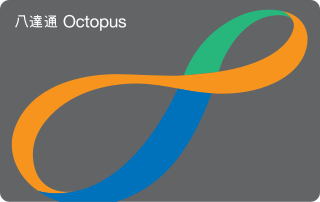Related Research Articles
7-Eleven, Inc. is an American convenience store chain, headquartered in Irving, Texas and owned by Japanese Seven & i Holdings through Seven-Eleven Japan Co., Ltd. The chain was founded in 1927 as an ice house storefront in Dallas. It was named Tote'm Stores between 1928 and 1946. After Ito-Yokado, a Japanese supermarket chain and the parent company of Seven-Eleven Japan, acquired a 70% stake in the company in 1991, the company became a wholly-owned subsidiary of Seven-Eleven Japan in November, 2005.

The Octopus card is a reusable contactless stored value smart card for making electronic payments in online or offline systems in Hong Kong. Launched in September 1997 to collect fares for the territory's mass transit system, it has grown into a widely used system for transport and other retail transactions in Hong Kong. It is also used for purposes such as recording school attendance and permitting building access. The cards are used by 98 percent of the population of Hong Kong aged 15 to 64 and the system handles more than 15 million transactions, worth over HK$220 million, every day.
Suica is a prepaid rechargeable contactless smart card, electronic money used as a fare card on train lines in Japan, launched on November 18, 2001. The card can be used interchangeably with JR West's ICOCA in the Kansai region and San'yō region in Okayama, Hiroshima, and Yamaguchi prefectures, and also with JR Central's TOICA, JR Kyushu's SUGOCA, Nishitetsu's Nimoca, and Fukuoka City Subway's Hayakaken area in Fukuoka City and its suburb areas. The card is also increasingly being accepted as a form of electronic money for purchases at stores and kiosks, especially within train stations. As of 2018, JR East reports 69.4 million Suica UID's have been issued, usable at 476,300 point of sale locations, with 6.6 million daily transactions.

The Kindaichi Case Files is a Japanese mystery manga series based on the crime solving adventures of a high school student, Hajime Kindaichi, the supposed grandson of the famous (fictional) private detective Kosuke Kindaichi. Written by Yōzaburō Kanari or Seimaru Amagi and illustrated by Fumiya Satō, the Kindaichi series was serialized in Kodansha's shōnen manga magazine Weekly Shōnen Magazine from October 1992 to October 2017, spanning a total of 76 tankōbon volumes. It is one of the earliest works in the mystery manga genre. In North America, the series was published in English by Tokyopop with the title The Kindaichi Case Files. Only the first 17 volumes were released by Tokyopop.

Seven & i Holdings Co., Ltd. (株式会社セブン&アイ・ホールディングス) is a Japanese diversified retail holdings headquartered in Nibanchō, Chiyoda, Tokyo. On September 1, 2005, it was established as a result of the integration of three companies: Ito-Yokado, Seven-Eleven Japan, and Denny's Japan. The purpose of this establishment was to create a holding company that would own these three companies. The background behind this decision was that the parent company, Ito-Yokado, was facing deteriorating performance, while its subsidiary, Seven-Eleven Japan, was experiencing growth in both sales and profits and was performing well.
Seven Bank, Ltd. is a Japanese bank. It is a subsidiary of Seven & I Holdings Co., Ltd.. Until October 11, 2005, it was IY Bank, taking its initials from Ito Yokado. Conducting its business primarily through the Internet, IY Bank has automatic teller machines in 7-Eleven convenience stores and Ito Yokado general-merchandise stores in Japan, and on April 27, 2005, opened its first branch with live staff. Customers with accounts at certain banks can process transactions at IY terminals at no cost; IY collects a handling fee from customers at other banks.

Waon (ワオン) is a Japanese electronic money system introduced by ÆON in April 2007. It is a rechargeable contactless smart card. Like many other smart card systems in Japan, it uses RFID technology developed by Sony known as FeliCa. Its name comes from waon (和音), meaning chord. The card's official mascot is a white dog. The card reader makes a "waon" sound upon successful transaction, a Japanese onomatopoeia for dog barks.

Culture Convenience Club Company, Limited is a Japanese company that operates Tsutaya (蔦屋), a chain of video rental shops and bookstores throughout Japan and Taiwan. The company is headquartered in Ebisu, Tokyo. The stock of the company was formerly listed in the first section of the Tokyo Stock Exchange, but it has since been delisted following a management buyout in 2011.

Shenzhen Metro Line 5, runs West–East from Chiwan to Huangbeiling forming an arc around central Shenzhen. It opened on 22 June 2011. Line 5's color is purple. Line 5 is an important east west and orbital line that connected various sub-centers of Shenzhen. This led to Line 5 being heavily used. In 2014, average daily ridership exceeds 500,000 people, with over 1 million passengers using the line on 20 July 2018, setting a new record. Since 2019, Line 5 has surpassed Line 1 as the busiest line in the Shenzhen Metro network. By 2021, the line regularly carries well over 1 million passengers every day and reaching the predicted long term daily passenger volume.
Apple Pay is a mobile payment service by Apple Inc. that allows users to make payments in person, in iOS apps, and on the web. It is supported on iPhone, Apple Watch, iPad, and Mac. It digitizes and can replace a credit or debit card chip and PIN transaction at a contactless-capable point-of-sale terminal. It does not require Apple Pay–specific contactless payment terminals; it can work with any merchant that accepts contactless payments. It adds two-factor authentication via Touch ID, Face ID, PIN, or passcode. Devices wirelessly communicate with point of sale systems using near field communication (NFC), with an embedded secure element (eSE) to securely store payment data and perform cryptographic functions, and Apple's Touch ID and Face ID for biometric authentication.
OKICA, short for "Okinawa IC Card", is a contactless transportation card used in Okinawa's public transportation system.

5x20 All the Best!! 1999–2019 is the fifth greatest hits album by Japanese boy band Arashi. It was released through J Storm on June 26, 2019. The album debuted at the top spot of the Oricon Weekly Albums chart, selling 1,304,251 copies in its first week of release in Japan. It spent the most weeks at number one of any album on the Oricon Albums Chart in 2019, with four, and was both the best-selling album of 2019 in Japan, as well as worldwide, with 3.3 million copies sold, eventually becoming the world's best-selling album of the year for 2019.
TwitCasting is a livestreaming service operated by Moi Co., Ltd., headquartered in Tokyo, Japan. In early 2013, TwitCasting was developed as a way to use the Twitter feed to stream content from smartphones directly onto a user's channel. As of July 2021, it had over 33 million registered users. As of March 2020, it had the most monthly active users among livestreaming apps in Japan, according to App Ape Lab analytics.
Ado is a Japanese singer. In 2020, at the age of 17, she made her debut with the digital single titled "Usseewa", which peaked at number 1 on Billboard Japan Hot 100, Oricon Digital Singles Chart, and the Oricon Streaming Chart. The song reached 100 million plays on Billboard Japan after 17 weeks from charting-in, which was the sixth fastest in history and the youngest for a solo singer. In 2022, her song, "New Genesis", was used as the theme song for the anime film One Piece Film: Red, and topped Apple Music's Global Top 100 charts.
d-anime Store (dアニメストア), previously known simply as Anime Store (アニメストア), is a Japanese subscription video on demand (SVOD) service majority-owned by NTT Docomo, with Kadokawa. It specializes in anime and was launched in July 2012.

Seven-Eleven Japan Co., Ltd. is a Japanese convenience store chain headquartered in Chiyoda, Tokyo. It is a subsidiary of Seven & I Holdings. The company was established in 1973 as York Seven by the supermarket chain Ito-Yokado in collaboration with Southland Corporation, now known as 7-Eleven, Inc, an American convenience store chain. As of 2022, Seven-Eleven is the largest convenience store chain in Japan in terms of sales and number of stores. Additionally, it is one of the largest retail chains in Japan in terms of sales. In 2004, it acquired full ownership of the original 7-Eleven, Inc.
References
- ↑ "Taking Another Step Forward" (PDF). 7 and i holdings. May 2008. Retrieved 9 March 2013.
- ↑ "Press release on July 3, 2007" (PDF) (in Japanese). IY CARD SERVICE Co., Ltd. 2007-07-03. Archived from the original (PDF) on November 7, 2007. Retrieved 2007-07-03.
- ↑ "平成28年2月期 決算短信〔日本基準〕(連結)" (PDF). 7 April 2016.
- ↑ "『nanaco』発行件数が500万件突破" (PDF). - セブン&アイHLDGS. 2007年10月10日
- ↑ "発行件数1000万件を突破いたしました" (PDF). - セブン&アイHLDGS. 2010年3月31日
- ↑ "電子マネー『nanaco』3月度月間利用件数が初めて1億件を突破!" (PDF). - セブン&アイHLDGS. 2014年4月18日
- ↑ Lin, Jerry (21 August 2008). "Bonus point system unveiled for 'icash'". Taipei Times. Retrieved 9 March 2013.